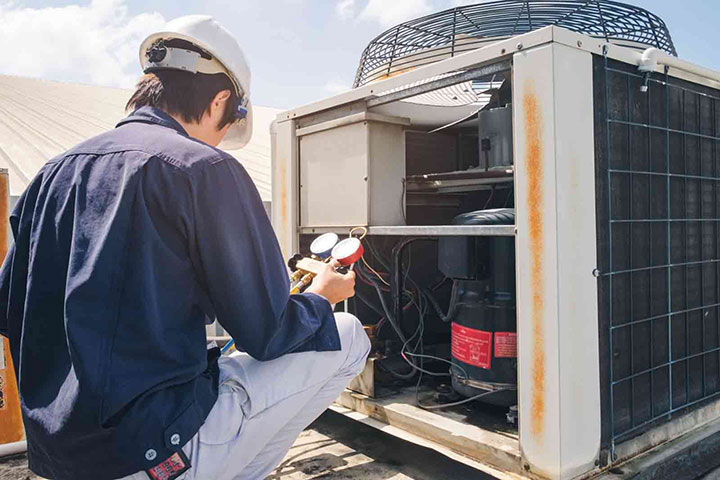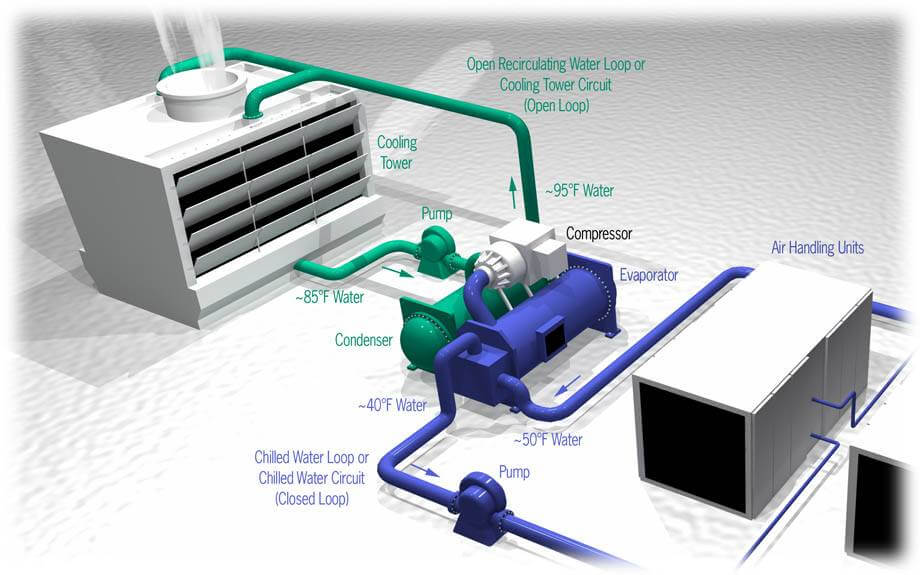Learn how HVAC experts guarantee efficient cooling performance
Wiki Article
Discovering the Necessary Parts of a Reliable A/c System
An efficient HVAC system is developed on several vital parts that operate in harmony. Each part, from the thermostat to the ductwork, plays a necessary role in keeping convenience and energy effectiveness. Recognizing these components is critical for maximizing performance and boosting interior air top quality. As one checks out these components, the complex partnerships between them disclose understandings into boosting overall system efficiency. What particular aspects add most to this performance?The Role of the Thermostat in Heating And Cooling Efficiency

Although usually ignored, the thermostat plays a critical role in the effectiveness of a/c systems. HVAC experts. This tiny gadget works as the main control facility, regulating temperature level settings and guaranteeing perfect comfort within an area. By precisely picking up the ambient temperature level, the thermostat connects with the air, air flow, and home heating conditioning systems to maintain the wanted climate
An efficient thermostat reduces energy usage by triggering the a/c system just when required, thereby avoiding too much home heating or air conditioning. Modern programmable and clever thermostats enhance this effectiveness further by enabling individuals to set timetables and remotely readjust settings, adapting to everyday routines.
In addition, the placement of the thermostat is crucial; improper place can lead to unreliable temperature analyses, resulting in ineffective procedure. Overall, a well-functioning thermostat not just enhances convenience yet likewise contributes significantly to power savings and the durability of the a/c system.
Understanding the Value of Air Filters
Air filters offer an important function in heating and cooling systems by guaranteeing that the air distributing within a room remains healthy and clean. These filters catch dirt, irritants, and various other pollutants, preventing them from being recirculated throughout the environment. By recording these particles, air filters contribute to improved interior air quality, which can considerably benefit owners' health and wellness, specifically those with allergies or respiratory system problems.Furthermore, preserving tidy air filters enhances the performance of cooling and heating systems. Clogged filters can limit air flow, creating the system to function tougher to maintain desired temperatures, causing increased energy intake and higher energy expenses. Routinely replacing or cleansing filters is an essential maintenance action that can lengthen the life-span of HVAC tools. Eventually, understanding the significance of air filters permits property owners and structure managers to take positive measures to guarantee a well-functioning, efficient HVAC system that promotes a safe and comfy indoor atmosphere.

The Performance of the Heater and Heat Pump
Heaters and heatpump are crucial parts of HVAC systems, responsible for giving heat throughout cooler months. Heating systems operate by home heating air through combustion or electrical resistance, then distributing it throughout the home by means of ducts. They generally supply fast heating and can be fueled by gas, electrical energy, or oil, depending on the system kind.On the other hand, heat pumps move heat as opposed to produce it. They remove warm from the outside air or ground, even in low temperature levels, and move it indoors. HVAC experts. This dual performance allows heat pumps to also provide cooling in warmer months, making them functional alternatives for year-round climate control
Both systems require appropriate maintenance to assure efficiency and durability. While furnaces succeed in extreme cold, warmth pumps can be advantageous in moderate environments. Recognizing their distinct functionalities help house owners in choosing one of the most appropriate choice for their home heating needs.
Discovering the Cooling Device
The cooling system is an important component of cooling and heating systems, available in numerous types to fit various demands. Recognizing the performance rankings of these devices is crucial for making educated selections concerning energy consumption and cost. This section will discover the varied sorts of a/c unit and clear up how efficiency scores impact efficiency.Sorts Of Air Conditioners
While different elements affect the choice of a/c systems, comprehending the different types readily available is important for property owners and structure supervisors alike. Central air conditioners are created to cool down whole homes or structures, using a network of air ducts for air movement. Window systems use an even more local solution, perfect for solitary rooms or tiny spaces. Mobile air conditioning system give flexibility, allowing customers to relocate the device as required. Ductless mini-split systems are an additional alternative, combining the efficiency of main systems with the ease of zoning, as they require no ductwork. Finally, geothermal systems harness the earth's temperature for energy-efficient air conditioning. Each type features distinctive benefits, making educated selections vital for effective environment control.
Performance Rankings Discussed
Understanding performance ratings is important for picking the right cooling device, as these metrics offer understanding into the system's performance and energy consumption. One of the most common rating for ac unit is the Seasonal Energy Efficiency Proportion (SEER), which gauges the cooling output during a common cooling season divided by the overall electrical energy input. A higher SEER indicates much better efficiency. Additionally, the Power Efficiency Proportion (EER) is made use of for gauging performance under details problems. Another vital metric is the Energy Celebrity accreditation, which symbolizes that a system meets rigorous energy performance standards. By reviewing these ratings, customers can make enlightened choices that not just maximize convenience yet additionally minimize energy expenses and environmental influence.The Importance of Ductwork and Air movement
Reliable ductwork layout and air movement management play critical functions in the total effectiveness and efficiency of cooling and heating systems. Proper ductwork warranties that conditioned air is dispersed uniformly throughout a space, minimizing temperature changes and enhancing comfort. Well-designed ducts reduce resistance to air movement, lowering the work on a/c devices and inevitably decreasing energy consumption.Air flow administration involves purposefully placing vents and registers to enhance the circulation of air. This avoids typical issues such as cold or warm areas, which can occur when airflow is obstructed or improperly well balanced. Furthermore, the best air duct products and insulation can better improve performance by lowering warm loss or gain during air transit.
An effective ductwork system not only contributes to energy cost savings however can additionally prolong the lifespan of HVAC equipment by lowering unnecessary pressure (HVAC experts). Recognizing the relevance of ductwork and air flow is vital for achieving peak A/c system performance.
Regular Maintenance Practices to Improve Efficiency
Routine upkeep practices are crucial for ensuring peak performance of HVAC systems. These practices include routine examinations, cleansing, and essential fixings to maintain the system running efficiently. Regularly transforming air filters is essential, as stopped up filters can block air flow and lower efficiency. On top of that, service technicians should check and clean evaporator and condenser coils to avoid getting too hot and energy wastefulness.Yearly expert inspections are also suggested, as experienced service technicians can determine prospective issues prior to they rise. Lubricating relocating parts lessens wear and tear, adding to a much longer lifespan for the system. Additionally, making sure that the thermostat operates properly aids in maintaining ideal temperature control.

Frequently Asked Concerns
Just how Frequently Should I Replace My Thermostat?
Thermostats should commonly be changed every 5 to one decade, depending on usage and innovation advancements. Routine checks are a good idea to assure peak efficiency, specifically if experiencing inconsistent temperature control or enhanced energy prices.What Size Air Filter Is Best for My Cooling And Heating System?
The very best size air filter for a heating and cooling system differs by unit layout. Usually, it's vital to seek advice from the proprietor's handbook or inspect the existing filter measurements to assure peak performance and air high quality.Can I Install a Heatpump Myself?
Setting up a heatpump independently is possible for skilled people, however it requires expertise of local codes and electric systems. Hiring a professional is recommended to ensure appropriate setup and ideal system efficiency.Just how Do I Know if My Ductwork Is Effective?
To establish ductwork performance, one must look for leaks, measure air movement at vents, examine insulation quality, and evaluate temperature differences between supply and return air ducts. Specialist evaluations can supply complete insights right into total efficiency.What Are Indications My A/c Needs Immediate Upkeep?
Signs that a HVAC system requires immediate maintenance consist of uncommon noises, inconsistent temperature levels, increased energy costs, unpleasant odors, and constant cycling. Dealing with these concerns quickly can stop additional damage and assurance optimal system performance.Air filters offer a vital feature in Cooling and heating systems by ensuring that the air distributing within a space remains healthy and balanced and clean. Additionally, maintaining tidy air filters enhances the performance of Heating and cooling systems. Ductless mini-split systems are an additional choice, combining the efficiency of main systems with the ease of zoning, as they require no ductwork. Understanding efficiency rankings is important for picking the ideal air conditioning device, as these metrics give more info understanding into the system's performance and power usage. The finest dimension air filter for a Cooling and heating system differs by unit style.
Report this wiki page